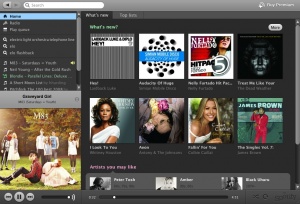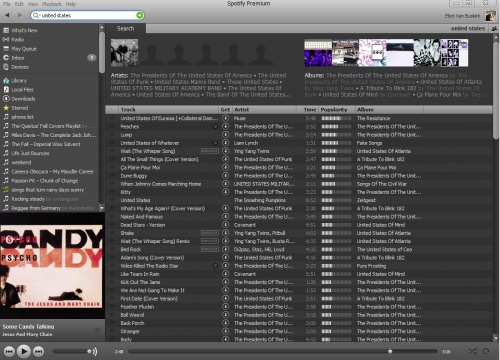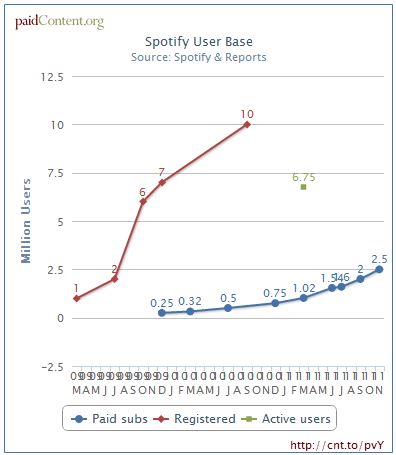Spotify
|
Contents
History
Spotify was founded in April 2006 by Daniel Elk and Marin Lorentzon in Stockholm, Sweden. The website was launched for public access on October 7th, 2008. At this time, select users were given free accounts and could invite a limited number of other users to also create accounts. These users were given Spotify Free accounts. The general public in the United Kingdom could open accounts, specified as Spotify Open accounts, without invitations beginning in February 2009. However, due to the unanticipated surge in new accounts, Spotify had to limit registration to by invitation only again. On April 14th, 2011, Spotify announced a change in the amount of music Spotify Open and Spotify Free users could stream. [2] Spotify was not launched in the United Sates until July 14, 2011, and requires new users to sync their account with their Facebook account.[3] Spotify is also available as a downloadable app for iPhone and Android for mobile access. In February 2011, Spotify was valued at about $1 billion and in November 2012, Spotify was valued at about $3 billion. [4][5]
Features
Playlists
Playlists can be created by any Spotify by putting selected songs into a specific group which is saved to the user's account and can be instantly accessed from any Spotify client. They can be shared with friends by emailing or instant messaging a link to the playlist. Upon following the link, the shared playlist is added to that user's library. Playlists can also be shared through social networking sites.
Mobile
Spotify can currently be accessed from a variety of mobile devices including any Apple product running iOS, Android, Blackberry and Windows mobile. To use Spotify on a mobile device, the user must subscribe to the premium service for $9.99 per month. There have been some complaints about the mobile app. Users cite problems with syncing their devices as well as the app frequently crashing. Other complaints with the mobile app include the inability to explore Spotify's vast library. Users are forced to build playlists of desired songs instead of searching for them on-the-fly if for instance, they are playing music while driving. Critics of the app say that the developers are poor programmers and need to find better ways for users to search for songs along with accessing the "top" sections of tracks, artists and albums.
Social Networking
Spotify has integrated social networking into their player, allowing users connected to Facebook, to share playlists with their friends, and post favorite songs to the site. Through Facebook, two friends can collaborate and make a playlist and then share their playlist to other friends. With the music posts features, instant playback is available on Facebook. Posting favorite songs to Twitter is also possible.
Offline mode
Spotify can be accessed without an Internet connection using the offline mode feature. This enables the user to choose specific playlists that sync to the computer or device allowing playback anywhere, including subways, airplanes, boats, and beaches. Songs and playlists are stored in the computer's cache for later playback. The mobile client also has a "Force Offline" mode which immediately stops Spotify from using the Internet. This can be especially useful for preserving battery life and data usage[6].
Apps
On November 30, 2011, Spotify Apps were announced[7]. The list of supported apps at the time of the announcement include Last.fm, We Are Hunted, Rolling Stone, The Guardian, Pitchfork, Tunewiki, and Songkick.[7] This feature will allow third-party and independent developers to bulid HTML5-based apps to supplement the Spotify service. Some of the expected tools will offer extra information regarding music recommendations, concerts, lyrics, and news.[8]
Membership
There are three levels of Spotify access: Spotify Free, Unlimited and Premium[9]. Out of the 10 million Spotify users, approximately 1 million are paying customers[10].
Spotify Free
The most basic version allows users to listen to all Spotify tracks instantly (at 160 kbps), create and share playlists and play local files. For the first six months, users are allowed unlimited listening, but afterwards they are only offered 10 hours/month. Advertisements are played after every few songs and are unavoidable. If the user drastically lowers the volume or presses pause during an advertisement, the advertisement pauses, leaving the user unable to listen to music until the advertisement ends. Users can share music through social networking sites or by sending links for friends. Spotify Open is a limited version of Spotify Free - it was in place for all interested users when Spotify was by invitation only.
Spotify Unlimited
Priced at $4.99/month, users have unlimited listening with no advertisements as you stream music. Users also have the ability to listen to their own local files through the Spotify software. This fee is based off of the Open Music Model and is supposed to help create an economic equilibrium for the recording industry.
Spotify Premium
Priced priced at $9.99/month, users have unlimited listening with no advertisements to a computer or mobile device. Users are also able to store songs and playlists in their computer's cache for use offline. Included in the Premium membership is exclusive content- access to pre-released albums and chances to win concert tickets. Also included in Premium is enhanced sound quality - audio streaming at 320 kbps. One of the biggest incentives for purchasing a Premium account is the ability to stream Spotify's library on the go. This feature is great for users who spend a lot of time traveling or for people who are not frequently around a laptop or computer.
Ethical Issues
There have been continuous debates about the ethical rights of Spotify. Not just by major labels and signed artists, but indie artists, and consumers themselves.
Ethical Concerns for Artists and Labels
The ethical question at hand is how much compensation artists should receive for streaming their music through services like Spotify. Most experts would say that the question of “compensation” cannot be answered accurately because Spotify doesn’t pay artists directly. The publishers, copyright holders, and record labels get the money depending on terms of condition. Spotify is a legal service because they only stream music rather than allow it to be downloaded directly, however ethical issues still surround the streaming music and subscription services. There are also indirect effects on the success of artists, separate from compensation paid directly to the publishers, copyright holders, and record labels that are hard to quantify. For example, Spotify's integration with Facebook, which has been a large cause for the software's success, provides self-sustaining marketing for any artist whose song is played. If a user has 50 Facebook friends online, and the Facebook ticker displays that he is listening to a song, those 50 users have been exposed to the artist, which will result in some expected value of sales for the label.
Ethical Concerns for Spotify Users
One thing that Spotify has done is educate its users on piracy. Using short advertisements, Spotify informs listeners that use of Spotify is not piracy, and that they properly compensate the artists you listen to. As a result of this brief education of piracy, Spotify has made a significant contribution in reducing piracy. In 2009, piracy in Sweden (where Spotify originated) dropped by 25% just one year after Spotify was launched [11]. Many contribute this downward trend of piracy to the popularity of legal music services, namely Spotify.
Another concern is the Terms of Service for Spotify. A Facebook account is required in order to use the Spotify application. The application defaults to a service where all of a user's activity on the application is posted to their profile, but many people do not read the Terms and don not realize this. Often times, new users are upset by this lack of transparency and notification of the application's actions. Users can manage their own Facebook privacy settings and not "connect" their accounts to post on their Facebook pages, however there have been many complaints that this is difficult to do and settings get mysteriously reset on timeouts. Secondly, some people are concerned that in order to use the application they must agree that information and data about them and their listening habits is being gathered and could be used by record labels and marketers to sell them their products.
See Also
References
- ↑ http://en.wikipedia.org/wiki/Spotify
- ↑ http://pansentient.com/2011/06/spotify-free-vs-spotify-open/
- ↑ http://en.wikipedia.org/wiki/Spotify
- ↑ http://dealbook.nytimes.com/2011/02/21/spotify-raises-new-investments-at-1-billion-valuation/
- ↑ http://www.ft.com/intl/cms/s/e11c1344-2e98-11e2-9b98-00144feabdc0,Authorised=false.html?_i_location=http%3A%2F%2Fwww.ft.com%2Fcms%2Fs%2F0%2Fe11c1344-2e98-11e2-9b98-00144feabdc0.html&_i_referer=http%3A%2F%2Fen.wikipedia.org%2Fwiki%2FSpotify#axzz2CIUrzHHC
- ↑ http://www.spotify.com/us/about/features/offline-mode
- ↑ 7.0 7.1 http://www.spotify.com/us/blog/archives/2011/11/30/say-hello-to-spotify-apps/
- ↑ http://www.spotify.com/us/about/apps/
- ↑ http://www.spotify.com/us/get-spotify/overview/
- ↑ http://www.bbc.co.uk/news/business-12676327
- ↑ http://torrentfreak.com/music-piracy-continues-to-decline-thanks-to-spotify-110928/





